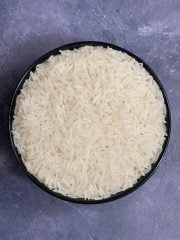

Is jasmine rice healthy? While it is high in carbs and calories, it is associated with several health benefits when enjoyed in moderation as part of a balanced diet.

0.6 milligrams pantothenic acid (6 percent DV)Ĭompared to white rice, the brown jasmine rice nutrition profile is lower in calories and contains a bit more fiber, calcium and iron.68 milligrams phosphorus (7 percent DV).0.1 milligrams vitamin B6 (7 percent DV).11.9 micrograms selenium (17 percent DV).0.7 milligrams manganese (37 percent DV).One cup (about 158 grams) of cooked white jasmine rice nutrition contains the following nutrients: Jasmine Rice Nutrition FactsĪlthough the jasmine rice nutrition label can vary a bit depending on the specific variety, most types are high in carbohydrates, along with micronutrients like manganese, folate, selenium and niacin. While white rice has undergone processing to remove the bran and germ, brown rice is a whole grain that contains all three parts of the rice grain.Īlthough less common, red, purple and black rice varieties are available from specialty retailers as well. Like other types of rice, both white and brown jasmine rice are available. This compound is also found in other foods, such as white bread and basmati rice, and is said to have a scent similar to hot buttered popcorn. It also has a unique signature scent, which is due to the plant’s natural production of aromatic compounds like 2-acetyl-1-pyrroline. It’s a bit shorter and thicker than other types of rice, such as basmati, and has a clingy texture that makes it well-suited for eating with chopsticks. Although it’s grown primarily in Thailand, Cambodia, Vietnam and Laos, jasmine rice has become a pantry staple around the globe thanks to its sweet and subtle flavor. Jasmine rice is a type of long-grain rice known for its floral aroma and soft, sticky texture. Plus, whole grain varieties may be associated with even more benefits, including improved heart health, decreased oxidative stress and protection against chronic disease. In addition to being versatile and easy to prepare, jasmine rice nutrition also brings a host of nutrients to the table, including manganese, folate, selenium and iron. Native to Thailand, this popular ingredient is prominent in southeast Asian cuisine and can be spotted in dishes ranging from curries to stir-fries. Earning its name from the fragrant jasmine flower, jasmine rice is an aromatic, long-grain rice that is favored for its unique taste and texture.


 0 kommentar(er)
0 kommentar(er)
